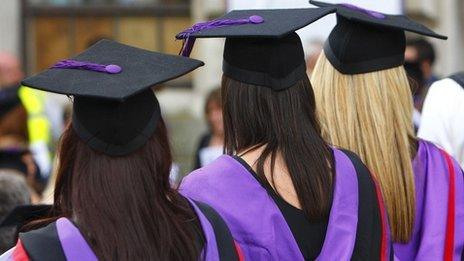University grade inflation disputed
- Published

University degrees are not getting easier, say researchers
The rise in university degree grades - in which 70% achieved higher than a 2:2 last year - is not caused by grade inflation, claim researchers.
The rise reflects "better prepared" students with better A-level results, says a study from Lancaster University.
Figures last week showed only 25% of students were awarded 2:2s in 2012-13.
The Lancaster study argues that improvements in degree grades are in line with the rising quality of the intake, as shown by A-level grades.
The study from economists at Lancaster University Management School looked at the changes in degree grades in UK universities from 2005-12.
It wanted to establish whether degree grades could be "considered as realistic or involve any level of 'dishonesty'".
Rising tide
Researcher Kwok Tong Soo says there was no evidence of universities contributing to grade inflation - and that rising degree grades reflected what could be expected from rising A-level grades.
On average, there had been an improvement in the quality of intake of one A-level grade per student, he said.
The only sign of "leniency" was among top universities, which researchers found were 8% more likely to award higher degrees, after the differences in A-level grades among their intake had been taken into account.
The study recognises that this is a "highly emotive subject" in which "educated people are loath to see their qualifications devalued by subsequent relaxation of standards".
However the researchers reject suggestions that universities have made it easier to get better degrees.
But Professor Alan Smithers, director of the Centre for Education and Employment Research at the University of Buckingham, rejects the idea that improving A-levels are the underlying factor in rising degree grades.
He says universities are under pressure to improve their standing in league tables and that higher degree grades are a way of scoring more points.
Even if universities did not want to compete in this way, he says, it is difficult for them not to follow, putting academics under pressure.
Prof Smithers suggests that harder-working students might be another factor, with worries about the jobs market pushing them to achieve higher than a 2:2.
There have been concerns raised about the difficulty for employers in distinguishing between students' results, when so many degree grades are clustered at the upper end of the scale.
This was highlighted again last week when figures for 2012-13 were released by the Higher Education Statistics Agency (Hesa), which showed that more than twice as many students achieved a 2:1 as a 2:2.
According to Hesa, in 2004-05, 11% achieved a first class degree, among full-time students last year, the figure was 19%.
This increase is part of a longer term trend. In the early 1990s, only about 8% of students achieved a first.
In the early 1980s, when fewer people entered university, about 60% achieved a lower second class degree, a 2:2, making it the most typical degree grade.
Now it is awarded to only about one in four and many major graduate employers use getting at least a 2:1 as a cut off for recruitment.
Martin Birchall, head of a graduate recruitment research company, said last week that three-quarters of the UK's top 100 graduate recruitment firms used a 2:1 degree as a minimum standard.
The Lancaster University researchers conclude their study by accepting that the debate is going to continue.
"The emotive nature of the content suggests that ours is unlikely to be the last word on the subject."